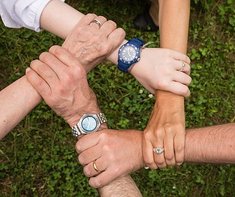
First, the daughters of Zelophehad set a new precedent for women by seeking their father’s land inheritance since he had no sons to carry on his legacy. Because of their willingness to ask God (through Moses) for this portion of land, their father’s name was preserved in Israel.
The second transfer between generations was the passing of leadership from Moses to Joshua. Things were shifting for Israel. Wilderness wandering was ending and it was time to enter the Promised Land. Had there been no transfer of authority, the encampment of Israelites would have remained in tents, stripped of their inheritance.
We all have the responsibility to connect what was to what will be. The transfer preserves our history and empowers our posterity. It’s the transfer of the baton on the grand relay race of life. Learning from these two examples can ensure a firm grip as we grasp hold of what has been handed to us and run the distance that will set up future generations for success.
1. Like the daughters of Zelophehad, we need to take our petitions to God. “We have not because we ask not,” (James 4:2). We just never know what we may be able to enjoy if we but simply ask. Gaining more in the spirit ourselves has the potential to prosper the generations to come.
2. God didn’t ask Moses to transfer all of his authority to Joshua. Instead, He instructed, “thou shalt put some of thine honour upon him, that all the congregation of the children of Israel may be obedient.” Some. We should never seek to be exactly like those before us, nor should our posterity have to mimic us. We each have to find our own identity, our own personality, our own place in the work of God. However, there is value in staying connected to what has already been established in the spirit. That’s our credibility. There are some things we don’t through away. Joshua stood on the principles Moses set: the same worship, same governance, same authority. We, too, hold fast to the spiritual precepts, clinging to sound doctrine (Titus 1:9), to instruction (Proverbs 4:13), to that which is good (1 Thessalonians 5:22), to Biblical-based traditions and teaching, (2 Thessalonians 2: 15), to faithful words (Titus 1:9), to the profession of faith (Hebrews 10:23). We don’t throw those things away to exercise spiritual freedom. These are battles that have already been won and are the basis of our liberty.
3. Conversely, what others received from God does not negate our own responsibility. Joshua had to follow God for himself, listen to God himself, obey God himself, trust God himself. We do, too, even if our ancestors were great men and women of God. To link that greatness to the next generation requires our own personal commitment.
4. God equips for the new thing. Each generation faces different circumstances than the preceding generation. Looking over our shoulders, we can draw strength from the knowledge that God helped others overcome their troublesome times or helped them pioneer a new path, but there has to be a personal connection that’s pertinent for the current times. Joshua didn’t have to trust God for food and water in a desert place, but he did have to trust God to show him how to exit the wilderness, how to oust inhabitants out of the land, and how to trade tents for permanent dwellings. But he was equipped. Unlike Moses, who only glimpsed the Promised Land before his death, Joshua spied out the land in his youth. He’d been part of the survey team. He knew what enemies he had to face, what strategies he had to employ as a conquering, military-minded leader. In addition, he knew the value of spiritual relationship, of having a support system, and of obedience to God because he’d served Moses since his youth. He was prepared for the future challenges he would face. We have to realize that we are equipped by what we’ve gleaned from the previous generation and the personal experiences we’ve had in God. We have the exact gifts and talents we need to fulfill our purpose and to solidify us in our position in the Body of Christ. Because we are qualified, we have the methods we need to be effective in our modern world.
5. What we add to our history builds a sure foundation and a higher height for our posterity. They start from a better, stronger place. They are prepared for their future, a future to which they will add their own talents and twists and trust.
Tips/Tidbit: You matter. What is good from the past that you can hold on to in your present and preserve for future generations? What can you build in your life today that will impact the generation to come? Your choices are significant. What kind of transfer are you making?
 RSS Feed
RSS Feed
